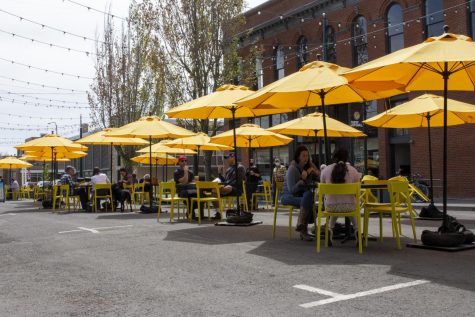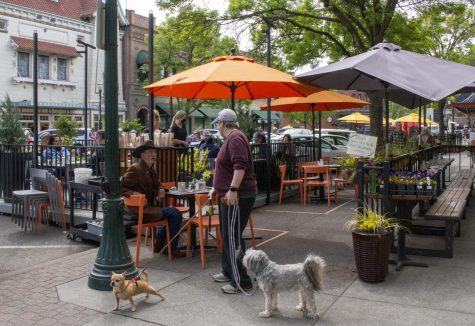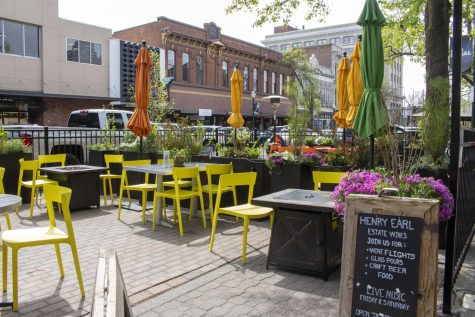Outdoor dining ‘streateries’ in downtown approved for another three years
April 29, 2021

The Walla Walla City Council unanimously voted on April 14 to keep “streateries” — the extended outdoor dining downtown — for another three years under a new set of guidelines.
The approved resolution followed an informal walkabout and survey of downtown businesses in which councilmembers stopped in every business along Main Street to gather feedback. 73 business owners favored streateries, five did not, and six did not fall clearly into either category.
“I was thinking back, as it was being discussed during the city council [meeting], to when I first heard of streateries,” Kathryn Witherington, Executive Director of the Walla Walla Downtown Foundation, told The Wire. “Very early on in the pandemic when I received an email from one of our downtown restaurants, Bacon and Eggs. It was a subject line that said ‘Could we do this here?’ and was a link to San Francisco, where they had started to add outdoor seating … and I forwarded that along to our city manager and he said ‘let’s talk about this.’”
Walla Walla decided to expand on the San Francisco model, which mostly consists of additional seating to closed parking spaces.
“The city really took the time to think on how these would look, how they would feel, to make them reflective of the pride that we have in our community and in our business owners here,” Witherington said.
This pride in community, she says, is what the new guidelines also address. Although not formalized in the city code for flexibility, the new standards require warm white lights and furniture of a consistent style and design. Businesses must also remove any tents or fabric panels once the new guidelines go into effect on May 1.

“There were zero guidelines about what type of fabric would cover the tops of them, how high they could go, what types of materials could be used in construction,” Witherington explained. “So the design standards will tighten that up to make downtown a little more uniform while also being loose enough to be reflective of the business that they’re connected with.”
Public House 124, the restaurant co-owned by Jim Sanders, has a streatery that extends into next-door Heritage Square Park. With this extended outdoor dining, approved by the city early on in the pandemic, he says the restaurant is experiencing close-to-normal numbers of customers despite only seating up to 50% capacity indoors.
“I have not heard one negative comment about the added outside seating from locals [or] from people who are coming from out of town — I haven’t heard one,” Sanders said.
While he fully supports the Council’s ordinance and is thankful for the city’s quick action to help businesses, Sanders noted that the seating does take up valuable parking spaces.
“I understand that argument a little bit,” Sanders responded, “but in the long run, I just think it brings more people downtown, [even] if they have to walk an extra block to get here.”
At the April 14 meeting, the council also voted to permanently close down 1st Ave, which is currently closed to cars to make room for street seating.
“What we want to do is bring the plaza floor up so it’s flush with the sidewalks on either side and then use brick pavers or some other type of surfacing material that’s more appropriate for plazas as well as install necessary infrastructure for the future of the plaza,” said City Manager Nabiel Shawa.
Such infrastructure likely includes drinking fountains, a gas main and electric power for vendors and entertainment. According to Shawa, the city plans to host music in the plaza beginning this summer.

Witherington remarked that she loves this “try it, see what happens, adjust as needed” model of doing things. “If it had failed we could have pulled [the streateries] out. But instead, it succeeded, and now we’re figuring out the whys and hows of how they’ll stay,” she said. “I think that’s how we make really cool, innovative things happen; that’s what I see in the streateries and I’m excited to bring more things like that in the future.”
Witherington also echoed Sanders’ sentiment with a commendation for the city’s quick action.
“It’s like so much else that the city did in COVID response that I think was so positive,” Witherington said. “The outdoor dining met an immediate COVID need, but it was really important to do it in a way that could help post-COVID.”






Donna Lange • Apr 29, 2021 at 9:34 am
As someone who just moved here in August 2019, I loved seeing the way the community pulled together to succeed during a very difficult time. And I love the look that downtown has taken on. I do think however, that the city also needs to get creative in regard to parking, as it’s at a premium now. Luckily, I’m a person who likes to walk. But many don’t, or can’t well. We either need a couple of free parking lots, or possibly lots slightly out of downtown with shuttle service. Or maybe even a few senior spaces for older citizens. Downtown isn’t just for tourists, but also the people who live here. If we’re going to be successfully creative, we need to do it on all levels.